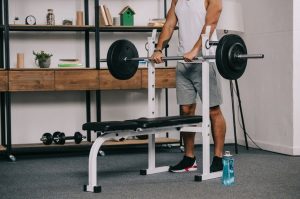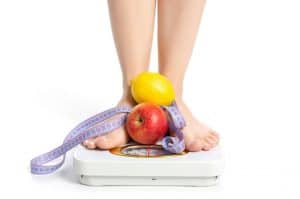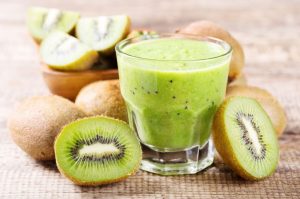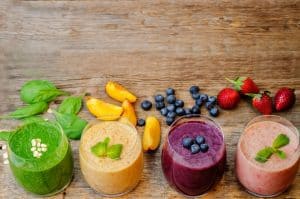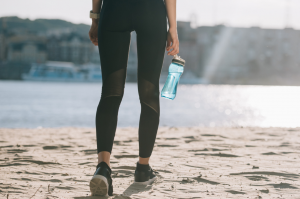Building muscle isn’t easy.
Not only do you have to show up and win the battle with the weights day after day, but you also have to wage war on another front.
If you have been consistently working out for a while now, but you just aren’t seeing the results you were hoping for, it’s almost certainly a result of your diet.
While it might be frustrating, nutrition is more important than exercise for building muscle.
And you might disagree with us when we say this, but sometimes knowing what to eat and how much to eat can actually be more of a struggle than fighting for to get that last rep in at the gym.
Why?
Well the simple answer is that most people want to get fast results, so their instant response to a muscle-building goal is to hit the gym five times a week until they eventually burn out.
This isn’t sustainable, and without the proper nutrition, it won’t even lead to great results.
While this might not be what you want to hear, there is some good news!
The good news is that eating for muscle growth doesn’t have to be expensive. A cheap muscle building diet plan is perhaps all you need to get motivated to commit to working out, since the only thing holding you back will be effort.
No, it isn’t necessary to go to a fancy restaurant and order the T-bone steak every week or cook up a gourmet meal complete with salmon fillets and caviar.
It’s perfectly possible to plan building muscle on a budget which makes muscle growth seem simple, as well as affordable.
That’s what we want to show you in this guide, so let’s get stuck in!
Important Factors
Before we jump in and discuss all the amazing cheap muscle-building foods to add to your grocery list, it’s important to understand why we’ve included them in the list.
After all, a diet full of just one food group isn’t going to serve your fitness goals.
The main factors you need to consider for muscle growth are calories, protein, and carbs.
Calories
Whenever you talk about a fitness goal, whether it’s losing weight or gaining muscle, it’s essential that you consider your caloric intake.
What is a calorie?
A calorie is a unit of measurement in food that refers to energy. So for example, a piece of broccoli might have 34 calories in it, which means it provides 34 calories of energy to the body when you consume it.
On average, we burn close to 1800 calories a day even if we’re not active.
As a result, we need to match that figure every day otherwise we’re going to lose weight because our body will be consuming more energy than we provide it, and then will turn to fat or muscle stores for extra energy.
For the average man, it’s estimated that 2,500 calories a day is necessary to maintain bodyweight, whereas for women the figure is closer to 2,000. These figures will vary according to body composition and calorie expenditure though so it’s worth finding out what the figure is for you.
With all that in mind, if your goal is to build muscle, you’re going to need to eat more calories than you burn in a day.
As such, you need to eat foods that are high in calories.
While you could in theory get all of your calories from broccoli, you would need to eat around 73 pieces of it in a day as a man just to maintain your current weight.
That’s why it’s important that you don’t just eat any old foods, but focus in on those which have a lot of calories, especially around meal times.
Protein
The second most important nutritional factor to consider when it comes to muscle-building foods is the amount of protein they contain.
You’ll often hear fitness experts refer to protein as the building block of muscle.
Without it, your muscles won’t recover and you won’t be able to effectively build muscle mass.
The amino acids that protein contains are essential for the muscle tissue in the body. Conveniently, these amino acids are called the essential amino acids because of their importance for the body, and the body can’t produce them naturally. That’s why we should seek the nine essential amino acids in our diet.
Leucine in particular is one of the most important of the essential amino acids, and you will often see protein powder supplements cite this by name as well as other EAAs because the brands want you to know that you’re getting the best for your muscles.
There are many theories as to what constitutes the perfect amount of protein for muscle development, so you’ll have to take them with a grain of salt.
Some of the most common formulas are as follows:
- Eat 1g of protein for every 1lb of bodyweight
- Eat 0.7g of protein for every 1lb of bodyweight
If you work with a personal trainer, it will be a lot easier to get an idea of how much protein you need to consume as they should be able to tell you based on your body composition and training intensity.
Carbs
Carbs, short for carbohydrates, are also an essential macronutrient to consume if you want to build muscle.
Carbohydrates are the body’s main fuel source, so if you want to have the energy to conquer regular workouts then you should try to include it in your pre-workout meals and snacks.
This macronutrient also plays a key role in replacing lost glycogen in the body and carrying nutrients straight to the cells of the body.
When eating alongside sources of protein, carbs can maximize your muscle gains and boost your recovery.
Carbs are divided up into two types: simple and complex.
Simple
Simple carbs are those which give you an instant burst of energy, which makes them ideal for a pre-workout spike.
Examples of simple carbs include:
- Fruit
- Candy
- Soft drinks
Complex
Complex carbs are best in the long run, as they provide a slow and steady source of energy.
Examples of complex carbs include:
- Sweet potatoes
- Oatmeal
- Beans
Affordable Muscle-building Foods
If you’re looking to build muscle on a budget, then the following cheap bulking foods should be just what you need.
With some creativity in the kitchen, you should be able to mix and match these ingredients in a way that makes you excited for your pre and post-workout meals.
Eggs
The first ingredient on your grocery list should always be eggs.
Unless you have an aversion to eating them, there’s no excuse to not eat eggs as part of a muscle-building diet.
Why?
Well, because eggs are a quality source of protein that contain healthy fats and nutrients.
In a single medium-sized egg you will get 6g of protein, which might not sound like much, but when do you ever eat just one egg?
A great way to make the most of eggs is to use them for breakfast for a variety of cheap bulking meals. Try making an omelet, scrambled eggs on toast, or a few fried eggs to kickstart your day.
Nutritional Information:
1 medium egg
Calories – 70
Protein – 6g
Carbs – 1g
Fat – 5g
Tuna
In terms of value for money, nothing comes close to a tin of tuna for the amount of protein it provides.
Plus, it’s incredibly simple to prepare as part of many cheap gym meals, requiring absolutely no cooking or seasoning.
There is a staggering 30g of protein in a single tin of tuna, along with a slew of other health benefits that you’d expect from eating fish.
Omega-3 fatty acids are another reason to eat tuna, especially if you don’t like to cook fish or simply don’t get much of it in your regular diet.
Nutritional Information:
1 tin of tuna
Calories – 120
Protein – 30g
Carbs – 0g
Fat – 1g
Chicken
Is chicken good for building muscle?
Chicken isn’t always cheap, but it can be, and it also happens to be one of the best sources of protein out there.
Bodybuilders don’t just eat chicken and broccoli to maintain the stereotype, believe it or not.
They eat this simple meal because it fuels their bodies and aids muscle recovery like few others.
It’s no steak, but your average chicken breast is a muscle-building staple that’s loaded with protein. You can expect around 22g of protein from just a 4oz chicken breast.
Chicken is also relatively high in calories, so if you include it as part of a big lunch or dinner then you’ll make good progress towards your calorie intake goal.
Nutritional Information:
4oz chicken breast
Calories – 100
Protein – 22g
Carbs – 1g
Fat – 2g
Beans
Beans are dirt cheap, and yet, they can form an important part of a muscle-building diet.
The main problem you’ll have with beans is making sure they aren’t bland, but you can typically pull this off with generous seasoning and clever meal preparation.
Most beans will be suitable for muscle growth, so take your pick.
Take black beans, for example, which you could combine with eggs for a protein-packed breakfast burrito.
Beans are also high in calories and carbs, so they satisfy several of the important criteria for muscle development.
Nutritional Information:
1 cup black beans
Calories – 339
Protein – 21g
Carbs – 63g
Fat – 1g
Greek Yogurt
It’s easy to overlook the power of Greek yogurt when it comes to sculpting a chiseled physique, but it’s foolish to do so.
Greek yogurt is a source of high-quality protein, which combines both whey and casein so you get the best of both worlds.
Why Greek yogurt specifically?
Well because normal yogurt just doesn’t cut it when it comes to protein content, sometimes having less than half that of its Greek counterpart.
Nutritional Information:
8oz Greek yogurt pot
Calories – 122
Protein – 5g
Carbs – 3g
Fat – 11g
Oats
Believe it or not, oats can actually be a great source of protein to add to your diet.
The key to getting the most out of oats is to combine them with milk to make porridge, which you can then add protein powder of peanut butter to. Alternatively, you could mix the oats with Greek yogurt and berries then store it overnight for overnight oats the next day.
You can even buy protein oats if you really want to get the most protein possible out of them.
Protein isn’t all they provide, though, since oats are also a good source of carbs and are high in calories,
Nutritional Information:
1 cup oats
Calories – 146
Protein – 6g
Carbs – 23g
Fat – 3g
Ground Beef
Much like the chicken breasts, ground beef isn’t going to give you the gourmet experience that steak would, but it’s an excellent source of protein nonetheless.
Plus, it’s much cheaper.
Ground beef is highly versatile too, since you can use it to make tasty burgers, protein-packed meatballs or a filling winter chilli.
Ground beef will give you a calorie-rich meal that will keep you feeling full, but be careful, as it also contains a lot of fat.
Nutritional Information:
112g ground beef
Calories – 200
Protein – 23g
Carbs – 0g
Fat – 12g
Milk
Milk is exceptional for building muscle on a budget.
As with Greek yogurt, it’s very versatile and has a lot of high-quality protein.
You will get the muscle gaining benefits from milk whether you add it to porridge, your morning coffee, or your post-workout shake.
You will also get a healthy dose of calcium with every serving of milk, which is incredible for building bone density and providing the muscles with a solid foundation.
Some fitness experts swear by milk, claiming they drink gallons of the stuff in the pursuit of muscle mass. While we don’t doubt the muscle-building potential of milk, this isn’t something we’d recommend.
Nutritional Information:
100ml whole milk
Calories – 63
Protein – 3.1g
Carbs – 3.6g
Fat – 4.6g
Whey Protein
If your budget stretches to whey protein, then it’s absolutely worth considering.
While it might not provide all the nutritional value of meat or eggs, it provides an easy and tasty way to boost your protein intake significantly.
If you struggle to hit your protein goal through diet alone, then protein powders can be a great supplement to throw in the mix.
What’s more, they’re highly versatile.
You can stir them into shakes, desserts, and even coffee.
Nutritional Information:
31g whey protein powder
Calories – 116
Protein – 24g
Carbs – 1.3g
Fat – 1.4g
Frequently Asked Questions About Building Muscle
What should you eat when trying to gain muscle?
When you want to build muscle, your number one priority should be finding foods that fuel your body and help accelerate muscle recovery.
That means you need to load up on protein, calories, and carbs.
Protein is the building block of muscle and speeds up recovery after a workout, while carbs provide fuel and energy for the body. You also can’t hope to gain muscle if you’re not at a caloric surplus.
How can I build muscle naturally?
To build muscle naturally, you need to make sure your nutrition and exercise plans are on point.
You can’t gain muscle without exercise, and you certainly can’t gain it without eating right.
As such, it’s important to plan your meals ahead of time and figure out your macros to ensure you head in the right direction. You also need to come up with an exercise plan that you can commit to and show up for on a regular basis.
Which fruit is best for muscle gain?
While fruit shouldn’t make up a significant portion of your diet if you want to build muscle, it can help in your pursuit of muscle mass.
Fruit is a great natural source of carbohydrates, which means they can provide a much-needed energy boost before a workout.
They also of course contain a lot of healthy minerals and vitamins which your body can use to function optimally.
A Final Word From Energetic Lifestyle
There are so many cheap muscle-building foods to choose from, which just goes to show that you don’t need to spend a fortune to get the body of your dreams.
As long as you stick to your diet, consuming a caloric surplus, and also commit to a regular workout plan you should hit your fitness goals in time.





